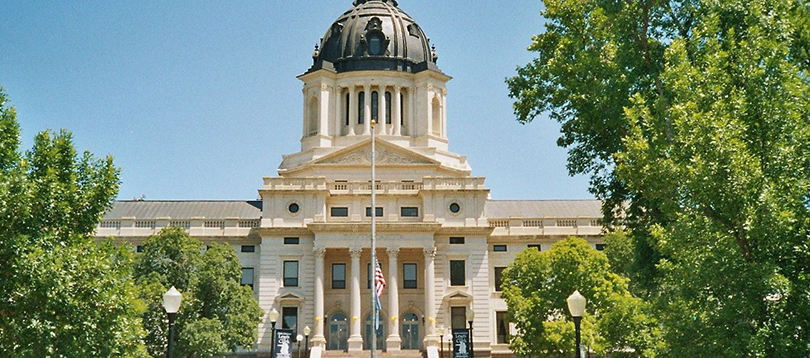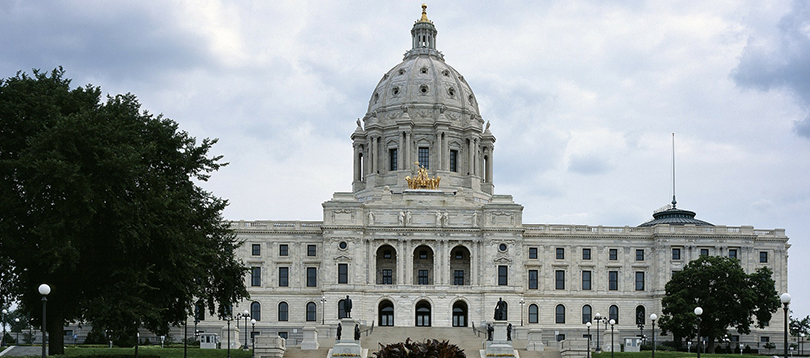State legislative updates shaping public power
February 13, 2025Key bills and issues in South Dakota and Minnesota
State legislatures are in full swing, and inevitably bills pop up that can impact public power.
The state utility associations work diligently to advocate for beneficial bills and lobby against those that would negatively impact the industry. Heartland keeps tabs on legislative activities and works with lobbyists to ensure our customers’ interests are being heard.
Here are a few bills and issues we’ve been monitoring.

South Dakota
Teleconference for open meetings
HB 1059 clarifies the meaning of teleconference for purpose of open meeting requirements. An official meeting would now be defined as:
“any meeting of a quorum of a public body at which official business or public policy of that public body is discussed or decided by the public body, whether in person or by means of teleconference or electronic means, including electronic mail, instant messaging, social media, text message or virtual meeting platform, provided the term does not include communications solely to schedule a meeting or confirm attendance availability for a future meeting.”
The bill passed out of the House of Representatives and will now be heard in the Senate State Affairs committee. South Dakota Municipal League (SDML) supports this bill.
Smart meter installation
SDML opposed HB 1217, which would have required customer consent for installation of a smart meter for a utility service.
The bill would have prevented a utility from installing a smart meter without first obtaining the customer’s written consent. The utility would also have had to provide information to the customer regarding: use of the smart meter in the collection, management, and storage of data; the type of data to be collected by the smart meter; and whether the data is to be sold to a third party.
The bill was heard in the House Local Government committee earlier this week and ultimately defeated.
Open meeting requirements
Governor Rhoden signed SB 74 earlier this week, which requires the publication and review of an explanation of the open meeting laws of the state. Essentially, a public body that is required to provide public notice of its meetings must annually review the explanation of the open meeting laws of the state during an official meeting.
The review must be noted in the minutes of the official meeting.
Data centers
SB 177 is touted by the South Dakota Economic Development Professionals Association (EDPA) as pro-growth, pro-technology and pro-jobs designed to position South Dakota as a leader in data center development. It seeks to attract high-tech investment, create high-paying jobs and enhance South Dakota’s role in national AI competitiveness by offering targeted sales tax rebates on equipment purchases.
The bill passed out of the Senate Taxation committee on a vote of 6-1 and was heard before the full Senate on February 12.

Minnesota
Minnesota Municipal Utilities Association has provided a list of issues it would like addressed by the 2025 Minnesota Legislature.
Nuclear
A nuclear moratorium in the state prevents any meaningful discussion on the possible use of nuclear power to meet the state’s carbon-free by 2040 mandate. MMUA is asking for a repeal of any legislative or administrative ban on nuclear power so all options can be explored.
Net metering
MMUA is also asking for reform of net-metering statutes to establish a more equitable compensation rate and reduce the total size of generating facilities eligible for net-metering from 40 to 20 kilowatts. MMUA is working with the Minnesota Rural Electric Association to draft legislation to this effect.
Bonding
They are also asking for support of a bonding bill to adequately fund programs and projects, allowing municipal utilities to make needed improvements and repairs. The lack of a bonding bill in 2024, the traditional bonding year, forces local governments to find other financing options or forgo projects, facing increased costs later.
EV charging stations
MMUA is also seeking clarification that while it is acceptable for third parties to charge customers for the use of EV charging stations, the power for the station must come from the utility serving the area.
Slow start to session
Minnesota’s Legislative Session kicked off January 14, but events leading up to that date, made for somewhat of a chaotic start.
The Minnesota House opened with Republicans holding a one-person advantage, but a power sharing agreement was not reached, and Democrats chose to refrain from attending session. While Republicans attempted to continue conducting business, Democrats argued a lack of quorum.
A January 24th Supreme Court ruling nullified any activities that had taken place without the needed 68-member quorum. Fortunately, last week House Republicans and Democrats announced they had reached a deal on a power sharing agreement which allowed them to return to the Capitol on Thursday and officially bring the House to order. Republicans hold a one-vote majority, but it is expected to go back to a tie after a special election on March 11.
